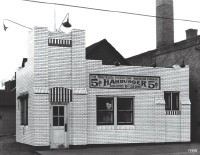The White Castle Experiment

However, the idea of conducting a fast-food diet experiment wasn't original to Spurlock. That honor goes to Jesse McClendon, a researcher at the University of Minnesota, who in 1930 fed a volunteer a diet of only White Castle hamburgers for 13 weeks. From the U of M Medical Bulletin:
McClendon knew that earlier studies had shown that adult dogs fed for a month on only lean meat appeared to fare well, and that humans on temporary all-meat diets lost calcium and phosphorus but didn't develop deficiency diseases. He planned to feed a single experimental subject only White Castle hamburgers—including the bun, onions, and pickles—and water for 13 weeks.
A willing subject presented himself: Bernard Flesche, a U of M medical student working his way through school. Flesche kept a diary during the ordeal. "He started out very enthusiastic about eating 10 burgers at a sitting," notes his daughter, Deirdre Flesche, "but a couple of weeks into it, he was losing his enthusiasm." His sister frequently tried to tempt him with fresh vegetables, but Flesche allowed nothing but White Castle Slyders™ to pass his lips.
A willing subject presented himself: Bernard Flesche, a U of M medical student working his way through school. Flesche kept a diary during the ordeal. "He started out very enthusiastic about eating 10 burgers at a sitting," notes his daughter, Deirdre Flesche, "but a couple of weeks into it, he was losing his enthusiasm." His sister frequently tried to tempt him with fresh vegetables, but Flesche allowed nothing but White Castle Slyders™ to pass his lips.
Flesche survived his ordeal without developing any significant health problems. The owner of White Castle interpreted this to mean that a hamburger diet is healthy and heavily promoted the experiment in advertisements. Flesche, however, who had once been a hamburger lover, developed a permanent aversion to them. He never willingly ate a hamburger again.
Comments
Commenting is not available in this channel entry.

Category: Food | Experiments | 1930s